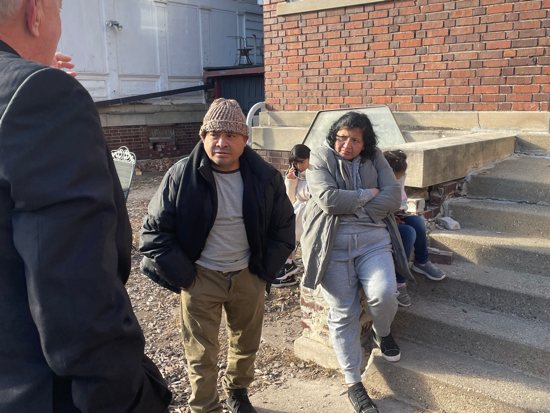
Ecuadorian immigrants are coming to the United States in record numbers, according to recent data from U.S. Customs and Border Protection. Many are finding their way to Minnesota as they seek shelter from increasing violence in their homeland and a government that seemingly has little power to stop it.
Some are arriving directly from Texas border crossings via that state’s chartered bus program. Others have taken advantage of a reticketing program that helps asylum-seekers in a secondary migration via air travel from New York City, where tremendous strains have been placed on emergency shelters and services.
As one of several states with measurable numbers of people of Ecuadorian ancestry, Minnesota has been the recipient of Ecuadorian immigrants seeking to connect with relatives, said Father Fernando Ortega, who ministers to a large Ecuadorian congregation at Sts. Cyril and Methodius in Northeast Minneapolis.
Estela Villagrán Manancero, director of the Office of Latino Ministry for the Archdiocese of St. Paul and Minneapolis, estimates that the Latino community in Minnesota numbers close to 350,000, with about 5 percent originally from Ecuador. U.S. Census demographics data support this estimate.
That number is growing as buses arrive weekly with three to five families of Ecuadorian asylum-seekers, mostly from Texas, Villagrán Manancero said. Sts. Cyril and Methodius has the largest Ecuadorian congregation, Father Ortega said.
The journey to seek economic freedom is an ongoing story for many impoverished Latin American families who come to the U.S. But Ecuadorians have journeyed to the U.S.-Mexico border in record numbers recently for another reason — to escape increasing violence.
Sometimes called a “cocaine superhighway,” Ecuador is the pathway to ports that ship the drug from Colombia and Peru to world markets. The international cartels that operate the drug trade forcibly recruit gangs of “foot soldiers” to facilitate and protect their market pathways by violent means with an arsenal of weapons that rivals that of the Ecuadorian army. Ecuador has become valuable ground to control for large international drug cartels, and the local gangs they employ fight for that control at the expense of innocent people.
Osman (who asked that his real name not be used) was waiting outside for several hours in below freezing temperatures Dec. 2 to get food from Cosecha del Corazon (Harvest from the Heart) at Incarnation in south Minneapolis. The line began forming at 7 a.m., three hours before the doors to the food shelf opened.
Many waiting in line, including Osman, were from Ecuador. Osman said he came to Minnesota five months ago with his wife and daughter from Tulcan, on the Colombian border. They took buses through Colombia, walked through roadless jungles and forded rivers of the Darien Gap in Panama, then took another series of buses through Central America and Mexico to the United States. Osman said his journey took a month and cost him $5,000. His story is shared by many recent arrivals from Ecuador fleeing the escalating violence.
“It’s a bad atmosphere with too much violence,” confirmed another Ecuadorian at Cosecha del Corazon, who also asked that his name not be used. He came to Minnesota from Ambato, a city along Ecuador’s “cocaine superhighway” to the major port city of Guayaquil. For this migrant and many others, there’s a high risk of violent assault and robbery just walking on the streets or riding a bus in their homeland.
Trying to survive on low wages amid rising inflation, Ecuadorians in certain areas of the country are victim to ‘”vacunas,” large payoffs for protection imposed on businesses and households by gangs working for the drug cartels, explained a missionary worker currently in Ecuador who asked that her name be withheld for her safety.
“A friend who owned a used car lot was charged $10,000 as an opening fee,” the missionary worker said in an email. “Some businesses receive threats from multiple bands requiring the vacuna to stay open. Many small businesses have folded because they can’t afford the payments. The effects on the economy are significant. The level of fear is on the rise, as well as hopelessness for any possibility of a stable job for oneself or one’s children in the future.”
Many Ecuadorians are placing their hopes in the promise of America.
“They are good people, their values are admirable, and the faith they have is amazing,” said Vividiane Dominguez, a ministry volunteer at Assumption in Richfield, which has a large congregation of immigrants from Latin America. “Hope for a better future, and trust in God is what makes them persevere and keep seeking a better opportunity in this country.”



